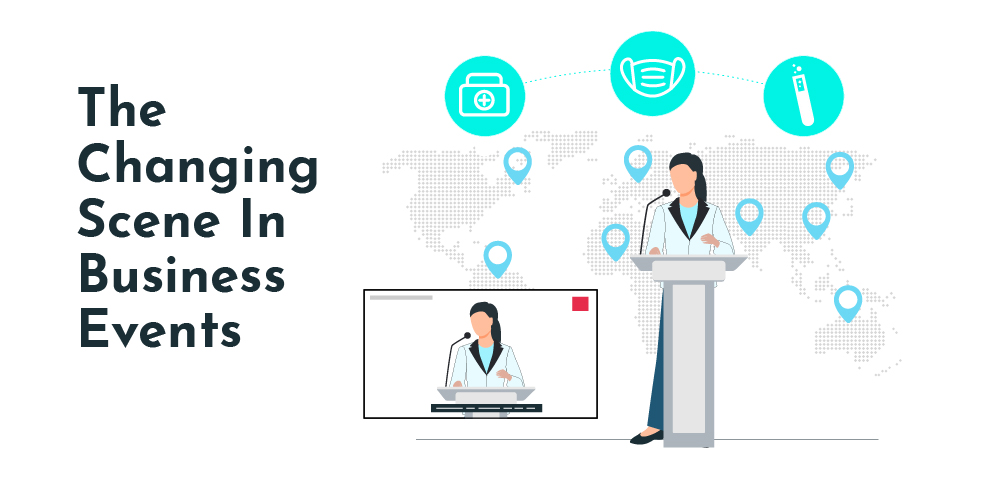
What Can the Business Events Industry Expect for the Rest of 2020?
Let us look at how positivity is making its way into the UK markets, and especially the business events industry. These insights will help us understand and plan for the rest of 2020.
Measures taken by the Government:
In September the covid alert level which measures the spread of the virus, was moved from level 3 where it is in general circulation, to level 4 where transmission is high or rising exponentially. The government also banned social gatherings above 6 in England from 14th September. This would probably dishearten a person, making him feel we are almost back to square one. But fortunately, the economy and the country at large, are looking for solutions to keep things going.
The Secretary of State for Health and Social Care explained that the government’s strategy involves suppressing the virus while protecting the economy and education. The strategy focuses on acting fast so as not to act bigger later. When it comes to having another full national lockdown, chances for that are very slim. The best and only option is to move quickly, which reduces the chance of having to come in hard later. The general thinking in government and healthcare has moved to protect people, particularly the most vulnerable, from the virus while keeping society functioning. There is an awareness that further restrictions of any sort come at a cost- whether to health, education, the economy, or all three.
If we look at the challenges for the coming days, the 2 main concerns to tackle are firstly the tough job of balancing all the possible negative effects, and secondly the fact that the coming winter, the time when respiratory viruses thrive, will make decision making so much tougher.
How the events industry is reacting to this situation:
Although government restrictions state that social gatherings above 6 are banned in England from 14th September, The Department for Culture, Media and Sport (DCMS) confirmed that business meetings and events for up to 30 people can continue. Clarity is still needed as Boris Johnson, announced that conferences and exhibitions will not be allowed to run from 1st October. The DCMS has also confirmed that smaller business and training events can take place in Covid-secure venues, i.e. venues that follow the official health guidance.
Jane Longhurst, chief executive of the Meetings Industry Association has expressed concern stating that “in the four days that have passed since the prime minister’s announcement, venues have already lost total event business worth nearly £2.4m and 126,000 jobs have already been lost.” Longhurst warned that a further 140,000 jobs remain at risk.
Deputy mayor for business, Rajesh Agrawal is also of a similar opinion. He stated that London’s events industry is “absolutely critical” to the economic health of the city. In an exclusive interview, he noted that events across all disciplines are worth £23bn to London annually, accounting for approximately a third of the overall £70bn value of the industry to the wider UK.
The deputy mayor made it clear that business events in particular have a significant impact on the wider economy.
How events are adapting and continuing to thrive around the world, and how they can be used as a learning experience:
Hybrid Events:
Although government restrictions state that social gatherings above 6 are banned in England from 14th September, The Department for Culture, Media and Sport (DCMS) confirmed that business meetings and events for up to 30 people can continue. Clarity is still needed as Boris Johnson, announced that conferences and exhibitions will not be allowed to run from 1st October. The DCMS has also confirmed that smaller business and training events can take place in Covid-secure venues, i.e. venues that follow the official health guidance.
Jane Longhurst, chief executive of the Meetings Industry Association has expressed concern stating that “in the four days that have passed since the prime minister’s announcement, venues have already lost total event business worth nearly £2.4m and 126,000 jobs have already been lost.” Longhurst warned that a further 140,000 jobs remain at risk.
Deputy mayor for business, Rajesh Agrawal is also of a similar opinion. He stated that London’s events industry is “absolutely critical” to the economic health of the city. In an exclusive interview, he noted that events across all disciplines are worth £23bn to London annually, accounting for approximately a third of the overall £70bn value of the industry to the wider UK.
The deputy mayor made it clear that business events in particular have a significant impact on the wider economy.
Virtual Events:
This is what the National Speakers Association did for a Successful Virtual ‘Experience’ rather than attempting a hybrid. They sought to remake an annual event into a virtual experience and introduced initiatives that will last into the future.
All keynoters’ presentations were prerecorded to minimize the risk of tech glitches. In the event, there was a problem with the Livestream — which there was — a backup plan was ready. When the speaker’s connection dropped, producers immediately plugged in a rebroadcast of a popular keynote session from a previous NSA convention in the live speaker’s place. The move was so seamless that audience members thought the rebroadcast was planned all along.
These examples prove that virtual or hybrid events are the way forward, and can be conducted with ease and success. Markets and businesses are adapting, and marketers/salespeople around the world will have to re-evaluate their lead data. The current situation of employees losing jobs, or going on furlough has led to data becoming stale. Hence existing data will have to be re-evaluated. This is a step forward in getting back to having successful events in the near future.
How to build an effective b2b lead list for cold calling and advertising
B2B lead lists, or prospect lists, have become an important aspect of businesses in today’s economy. By having a targeted list of potential customers, you can focus your efforts and resources on those who are more likely to be interested in your product or service, increasing your chances of success. Some of the major applications of a B2B lead list are cold calling, advertising and email marketing.
Reaching out to new prospects and eventually converting them into customers is directly proportional to a company’s growth and increasing revenue; therefore, leveraging a high-quality B2B lead list is beneficial for your marketing and sales teams.
Ascentrik Growth Story 2022 2023
B2B Data validation and enrichment is the practice of refining your existing CRM database by eliminating redundant and unwanted contact information and appending additional data points to your prospects’ records like phone numbers, industry, size of the company, designation, etc. It is one of the most beneficial practices for both your marketing and sales teams.
Refreshing your email list can be seen as an ongoing process during your marketing campaigns, as it allows you to source highly qualified leads, which enables targeting the right person with the right message. It can help your sales team with customer segmentation and lead scoring, allowing them to create personas for your prospects and craft a personalised sales pitch, improving the chances of converting them into customers.
But what is the most profitable method to get this highly valuable task done? Is it software tools for automated data enrichment or tools enhanced with data research by a team of experts? Find out the benefits of both in the article below.
How Contact Data Enrichment helps in converting more Leads
Customised contact and company data enrichment for niche targets, using automation and a team of researchers


